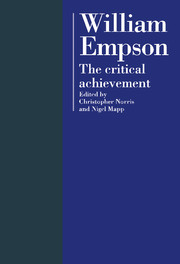Book contents
- Frontmatter
- Contents
- Contributors
- Foreword
- 1 Introduction: Empson as literary theorist: from Ambiguity to Complex Words and beyond
- 2 Empsonian honesty and the beginnings of individualism
- 3 Empson, Leavis, and the challenge of Milton
- 4 Empson's Satan: an ambiguous character of the seventh type
- 5 Compacted doctrines: Empson and the meanings of words
- 6 Figural narrative and plot construction: Empson on pastoral
- 7 More lurid figures: de Man reading Empson
- 8 Fool and pharmakon
- 9 William Empson's cosmicomics
- 10 Empson as teacher: the Sheffield years
- References
- Index
10 - Empson as teacher: the Sheffield years
Published online by Cambridge University Press: 01 June 2011
- Frontmatter
- Contents
- Contributors
- Foreword
- 1 Introduction: Empson as literary theorist: from Ambiguity to Complex Words and beyond
- 2 Empsonian honesty and the beginnings of individualism
- 3 Empson, Leavis, and the challenge of Milton
- 4 Empson's Satan: an ambiguous character of the seventh type
- 5 Compacted doctrines: Empson and the meanings of words
- 6 Figural narrative and plot construction: Empson on pastoral
- 7 More lurid figures: de Man reading Empson
- 8 Fool and pharmakon
- 9 William Empson's cosmicomics
- 10 Empson as teacher: the Sheffield years
- References
- Index
Summary
William Empson earned his living as a teacher of English Literature. What follows is an account of one man's experience as his pupil. This is limited, but it is better than no account, which is what we have had until now.
I first made contact with William Empson in 1959. After four years away from Cambridge, where I studied under F. R. Leavis, I had decided to research into an aspect of literary theory. This was an unusual topic thirty-three years ago, and Empson, with his range of interests and concern with theoretical problems, seemed the best person with whom to work. So I went to Sheffield.
After some preliminary discussion, Empson decided on a working title for what was to become my Ph.D. thesis: ‘Some Reasons for the Great Variety of Response to Literature among Modern Literary Critics’. This was a discussion of critical divergences and controversies, with a view to finding whether there was a theory of value that could emerge from the practical consideration of literature. I worked full-time at this thesis between 1959 and 1962, and continued part-time until 1968, when my doctorate was conferred. Empson's technique of supervision was to encourage me to write as much as possible. I typed out draft investigations into critical controversies, and I called these ‘enquiries’. I took care to leave wide margins on which Empson could write his comments.
- Type
- Chapter
- Information
- William EmpsonThe Critical Achievement, pp. 294 - 307Publisher: Cambridge University PressPrint publication year: 1993
- 1
- Cited by

